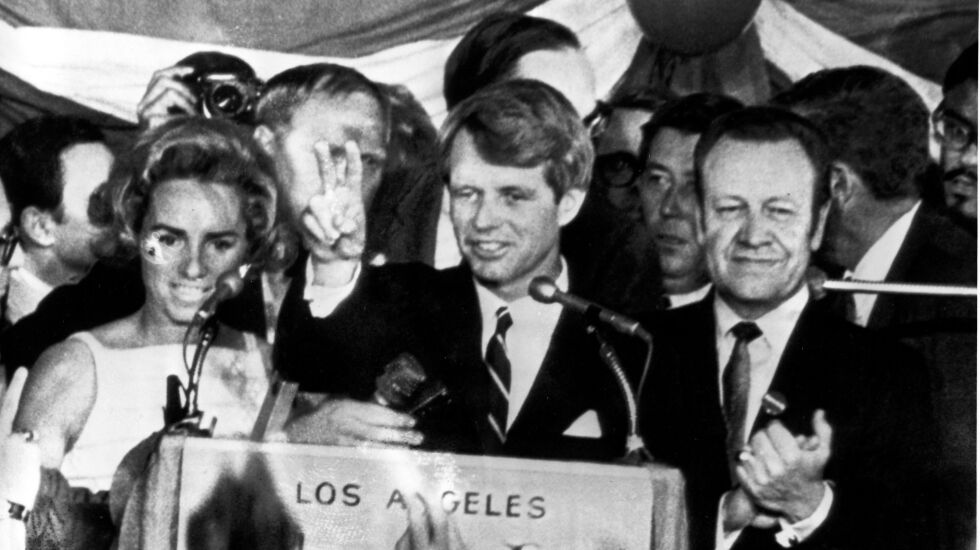
Growing up, I loved to listen to famous political speeches. One of the speeches that caught — and held — my attention was New York Sen. Robert Kennedy’s speech to the Cleveland Economic Club on April 5, 1968, the day after Martin Luther King was assassinated.
In a quiet, somber voice, Kennedy said, “I have saved this one opportunity to speak briefly to you about the mindless menace of violence in America which again stains our land and every one of our lives ... They (victims of violence) are, most important of all, human beings whom other human beings loved and needed. No one — no matter where he lives or what he does — can be certain who next will suffer from some senseless act of bloodshed. And yet it goes on and on and on in this country of ours ... Why?”
June 1968 was going to be a crucial month for Kennedy’s campaign, with an all-out effort to win support and delegates aided by momentum from the California win.
But the awful events of June 5, 1968, changed all that, just like the recent awful mass shootings across America that same weekend in 2022 — and in Uvalde, Texas, and Buffalo, New York, in May — ended the lives of dozens of innocent Americans.
The bullets that took the life of Sen. Kennedy not only robbed Americans of a choice for president in 1968 and changed the trajectory of American politics and policy, but they also robbed a family of a husband and a father. In 2017, Chris Kennedy, one of RFK’s children, spoke for the first time about the painful ripple effect that violence inflicted on his family.
Kennedy broadened the issue to say that the “ripple effect” in each community is devastating.
But there was another passage from RFK’s Cleveland speech that is relevant today.
“For there is another kind of violence,” said Kennedy, “slower but just as deadly destructive as the shot or the bomb in the night. This is the violence of institutions — indifference, inaction and decay.”
America’s political institutions — state legislatures, Congress, presidents, courts — have too often been indifferent to the assault weapon violence that is a cancer in this country. And this issue doesn’t need to be partisan.
Back in 1994, three former presidents — two Republicans (Ronald Reagan and Gerald Ford) and one Democrat (Jimmy Carter) — wrote a letter to Congress urging members to ban military-style assault weapons. “This is a matter of vital importance to the public safety,” they wrote. No one could ever accuse Reagan and Ford of being against gun rights and the Second Amendment.
America’s gun violence epidemic makes this nation stand out around the world. Every nation suffers from mental health challenges, but only one suffers from in excess of 100 mass shootings each year.
We know solutions to gun violence are complex, but they involve action — action to enact better background checks, red-flag laws, restrictions on high-capacity magazines and military-style assault rifles, investments in mental health, enhanced school safety and more effective prosecution of gun crimes.
Our police officers are too often out-gunned by criminals carrying AR-15 rifles that threaten law enforcement’s ability to carry out its duties. The House’s recent passage of the Protecting our Kids Act reflects action.
Will the Senate’s bipartisan effort yield action in the days ahead?
Robert Kennedy once said the “purpose of life is to contribute in some way to making things better.” Perhaps Congress and President Joe Biden can honor the slain children — and Sen. Kennedy’s life — by taking action in 2022 to keep our children safer in schools and Americans safer in grocery stores, churches, theaters and anywhere else they gather.
If he were alive today, Robert Kennedy would likely be speaking to both rural and urban America with the same message: That it’s our moral responsibility to make society safer for our children, and that we all need to try a little harder to make that happen.
Porter McNeil is an Illinois-based communications consultant and was Illinois communications director for the Kerry-Edwards 2004 presidential campaign.
Want to submit an op-ed or letter to the editor? Here are our guidelines.







